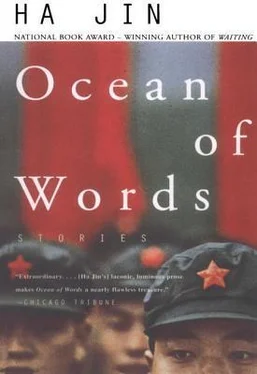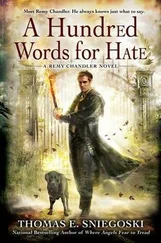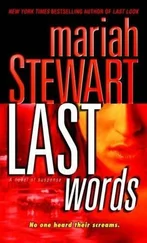I shook off his hand and cursed, “Damn you, taking home a bride in a dream.”
He turned over and went back to sleep.
The next day I told the squad about Jee’s midnight fantasy. They sat around and asked him what the girl had looked like and why he’d compared her to a willow. What kind of willow exactly? A weeping willow? A silky willow? A red willow? Jee was mad at me because he couldn’t remember the dream and believed I had made it up. “Fan Hsiong, I screw your sisters! You, such a small boy, can tell a lie as big as Heaven!”
I didn’t argue and merely said, “I don’t have a sister.”
“Even if he had,” Wu put in, “how can you do that, miss?”
“I did it to your mother!”
“Let’s see how big you are.”
We laughed heartily. Wu spilt the tobacco he had been rolling into a cigarette with his large hands.
Like us, Jee was very interested in women. He claimed he had a fiancée, whose father was the commune chairman at home. Nobody believed him, though. I once flipped through his diary secretly, to see if he really had a girlfriend. To my dismay, almost everything he had written was related to fighting the Russian Revisionists and guarding the northern frontier. In one item he even said, “I won’t regret it if I die ten times for our great Motherland.” I never mentioned the contents of his diary to anybody, though impressed by his sincerity.
Jee often argued with Zheng Yuan about women, bragging that in his hometown there were lots of young beauties whose faces were as white and soft as fresh tofu. It was this habit that made him an enemy of Zheng Yuan. According to Zheng’s own words, which must be taken with caution, Zheng’s maternal grandfather was a top general in North Korea, so his mother was Korean whereas his father was Chinese. In other words, he was a hybrid. He tried convincing us that his mother was the most beautiful woman on earth. I doubted it, because he was so short; though eighteen, two years older than myself, he was three inches shorter. How could a beautiful woman, a general’s daughter, give birth to such a thick-boned, bean-eyed, toothy dwarf? Jee never believed a word of what Zheng said and always challenged him. “Don’t boast about your mother. Just show us her picture. Let’s see what a goddess she is.”
Of course Zheng was never able to produce such a photo. He would fight Jee on the drill ground, since Jee was the worst soldier in our company. When they were paired off for bayonet practice, Zheng would stab Jee’s forearms and hands with the rubber head of his wooden gun. He could do it easily, and Jee simply couldn’t parry a jab. Once hit, he would throw his weapon to the ground and squat down, rubbing the wound and calling Zheng Barbarian Bastard. Within a week some black patches appeared on his arms and the backs of his hands. Later he just refused to practice with Zheng, and our squad leader had to keep them separate.
It was even worse that Jee could not throw a grenade. However hard he tried, at most he threw it sixteen meters. Seeing it land so close, Zheng Yuan, the “Little Cannon” who could throw it forty-five meters easily would say, “I can send it that far with either of my feet.”
The minimum requirement was thirty meters. I made only twenty-eight; though both Jee and I couldn’t pass, nobody laughed at me — I was close. Besides, I was three years younger than Jee. When it came to the final test with the real grenade, everybody was afraid to be grouped with Jee. Because we two had the weakest arms, Platoon Leader Ding made Jee and me the last pair to throw.
The range was in a cornfield beyond the southern hill. There was a deep ditch at the end of the furrows, so we could hide ourselves in it when the grenade throwers carried out the test in the field. Two by two my comrades took their turns. Everybody passed and said the real grenade was lighter than the fakes used for training. When our turn came, I had got somewhat used to the explosions, and my heart stopped kicking. Still, I felt uneasy about Jee. Platoon Leader Ding handed Jee and me each a grenade and pointed to the large triangle he had drawn with his boots in the snow-covered field. “Stay calm and throw it into the target.”
Jee was on my right, the platoon leader on my left. We twisted off the caps and hooked the rings onto our little fingers.
“Ready —” Platoon Leader Ding raised his hand. “Throw!”
The grenades flew off our hands, swishing like flapping wings. We both lay prone immediately. The platoon leader fell on my back, covering me. One grenade exploded in the distance, then the other thundered right in front of us. My eyes blurred, I was deafened. Smoke and snow dust filled the air; my hat was gone, and I felt my neck tight and numb.
“Killed!” A vague voice came from the ditch a few seconds later. “Hey, are you all right?”
No answer. Platoon Leader Ding managed to sit up. “Terrible! My grandma, terrible.”
Some men ran over. Jee and I were still lying on the ground. He was motionless. “What happened?” our squad leader asked. I turned over and tried to get up.
“Terrible, he threw it only nine meters.” The platoon leader pointed at Jee.
“Are you all right?” Song Ang asked me. He took off the slips of corn stubble from my hat, which he had recovered from God knows where, and put it on my head.
“I don’t know,” I moaned. “I feel queasy.”
Meanwhile Jee was helped up. He sat on the ground, his face covered with blood. “Hey, bring over a first-aid dressing,” Guan shouted to the men in the ditch.
“Jee doesn’t look injured,” Song Ang said.
“No,” Jee said. “I’m all right, not injured. My nose has a bleeding problem. Sorry, I didn’t throw it well. Rub some snow on my forehead.” He sounded so calm, like an experienced soldier.
At once everybody relaxed, but we remained silent as if we had yet to recover from the shock. I was told that my grenade had reached twenty-nine meters, within the target; since it was only one meter short of the requirement, Platoon Leader Ding let me pass. I was happy, though a fragment of Jee’s grenade had pierced a hole in my fur hat. Jee alone flunked the test.
Before long another two lines were composed about him. In addition to the former couplet, the company now chanted this one:
Miss Jee threw a hand grenade
Only to have her looks remade.
As his fame increased, Jee grew reticent. Even if somebody hummed the couplets in his face, he wouldn’t respond. At night he became less fitful than before and seldom woke me. Still many of us kept teasing him; some even brought him soft toilet paper for his periods, or asked him to sew on a button, or claimed to be his bridegrooms.
One thing we could not complain about Jee was that he did not eat much. Except for him, all the new soldiers ate like wolves. At every meal we bolted down the first bowl of sorghum and refilled it as many times as possible. The Recruit Company was a temporary unit without any surplus provisions, and most of the new soldiers were from the countryside and had no grease in the stomachs, so we ate and ate and ate. Lacking fresh vegetables, a month later over a dozen soldiers suffered from snow blindness, and many had chapped scrotums and walked bowlegged. Our regiment made an urgent request to the Divisional Headquarters for vitamins.
But there was no problem with Jee; it was as though he belonged to a different species. He always ate two bowls at a meal, while the rest of us devoured at least twice as much and still felt hungry at drill. I never heard Jee complain of hunger. Neither could I tell whether he ate like that because of his small appetite or because of his healthy diet. In any case, he didn’t eat like a man.
One Tuesday morning, we had a meeting which was designed to recall the past miseries and appreciate the present happiness. At lunch only bitter buns, made of husks and wild herbs, were served as a sample of what life had tasted like in the Old China. We couldn’t eat them. Most of us threw them away secretly, but Jee chewed and swallowed his three buns with relish. In our squad only he finished the meal. That afternoon at drill, when we complained that our stomachs were rumbling, he smiled and said that we had been spoiled by our parents and that we had no idea what genuine suffering was like. Little wonder we were such rascals.
Читать дальше











